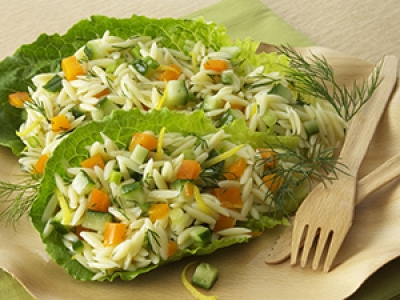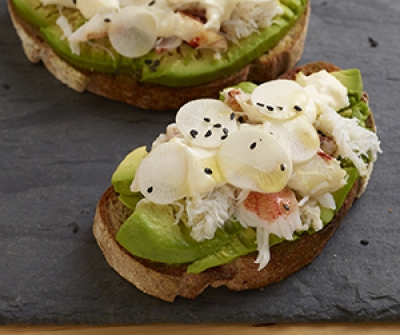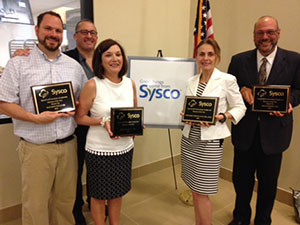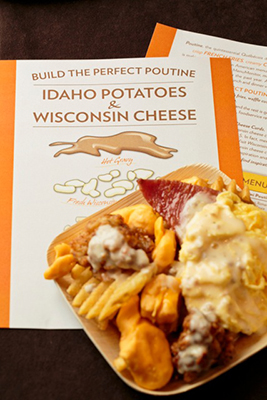
“Olive Oil. The One You Love.”
Tuesday, 04 August 2015 03:00The North American Olive Oil Association launches a consumer initiative to boost the comparatively low—but greatly improved—per-capita U.S. consumption of 1 liter of olive oil per year.

The North American Olive Oil Association launches a consumer initiative to boost the comparatively low—but greatly improved—per-capita U.S. consumption of 1 liter of olive oil per year.

California Avocados are at peak quality through August. When slightly mashed and slathered on toasted bread—which is trending right now—fresh avocados transform a breakfast side into a satisfying meal and provide foodservice with a springboard of creativity.
 In the award program’s inaugural year, two secondary and two postsecondary educators earned recognition for distinction in training professional cooks of tomorrow at the 11th-annual CAFÉ Leadership Conference in June.
In the award program’s inaugural year, two secondary and two postsecondary educators earned recognition for distinction in training professional cooks of tomorrow at the 11th-annual CAFÉ Leadership Conference in June.
Sysco, the world’s leading foodservice distributor, recognized four foodservice educators in the 2015 CAFÉ/Sysco Corporation Educator of the Year Awards at the 11th-annual Leadership Conference of the Center for the Advancement of Foodservice Education (CAFÉ), June 18 in Niagara Falls, N.Y.
“In our first year of supporting this new annual award that acknowledges the tremendous industry contributions of foodservice instructors throughout the United States, we were introduced to many genuinely gifted teachers,” says Neil Doherty, CEC, Sysco’s senior director of culinary development.
“All of them submitted amazing endorsements from their administrators, program and industry colleagues and former and current students—making the selection of only two award recipients and two runners-up from both high-school and college-level training programs extremely difficult. In the end, thanks to their extraordinary career accomplishments, four individuals stood out.” They are:
 Real information power comes when operators begin to consolidate and review all their data, to reveal the complete picture they need to make better business decisions.
Real information power comes when operators begin to consolidate and review all their data, to reveal the complete picture they need to make better business decisions.
By Dave Bennett
Culinary educators know their students seek out the foodservice industry for many reasons: They simply love to cook, they excel in the high-energy foodservice environment and they see long-term career potential and an opportunity to make a name for themselves.
Few, if any, culinary students will profess they are in it for the statistics.
Minding the numbers goes beyond containing food or labor costs. Effectively leveraging restaurant information can be the key to profit and financial success. It can be the difference between driving defensively, stuck forever in the right lane, versus pulling away from gridlock to lead the competition.
There are three main reasons that operators should mind (and mine) their business data. This article will address two of those reasons; the third reason will be covered in the second article in this series.
#1: Information is power
Harnessing a restaurant business’ information can, and should, ultimately increase earnings. Information is power, power that can be converted into dollar signs. The trick is to learn how to put that information to its best use.

Versatile Idaho® Potatoes provide the canvas as culinarians get creative.
For a dish of humble Canadian origin, poutine—a savory amalgam of crispy French fries gilded with cheese curds, beef gravy and an optional egg—has quickly established a substantial presence on American menus.
A distinctive variation on loaded fries and an American quick-service favorite, poutines of all stripes are popping up in fast-food and casual-dining operations across the country, much to the delight and enjoyment of customers who enjoy their fries with a side of creativity.
Whether served as an appetizer or entrée, poutine is a popular dish that starts with a menu basic—crisp Idaho® potato French fries—and can absorb other standard menu ingredients with aplomb and style. For example, surplus short-rib orders make a rich, meaty gravy. Cheeses salvaged from salad and appetizer orders melt atop sizzling fries to offer an intriguing new flavor profile.
Finally, we’ve talked fries, but why stop there? Idaho hash browns, tots and country potatoes also provide an excellent foundation for a signature poutine.